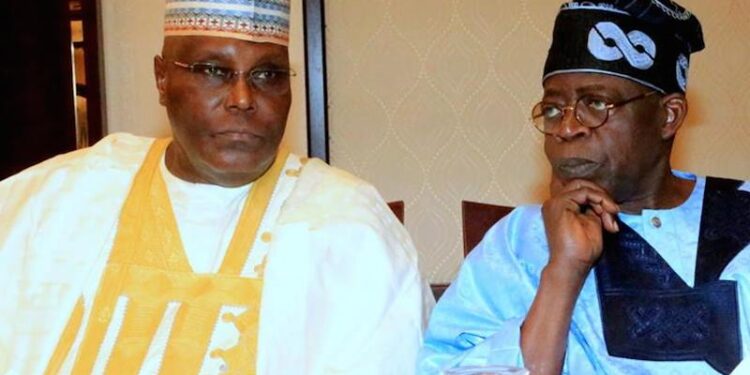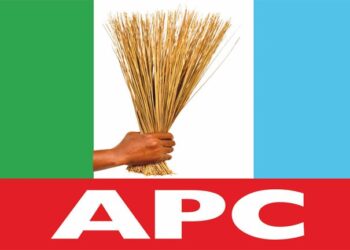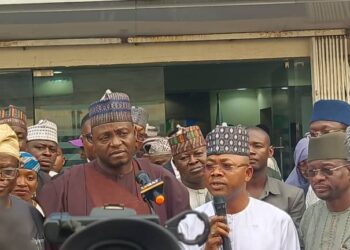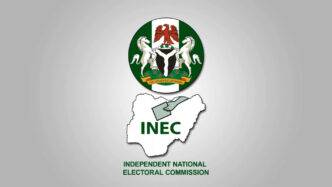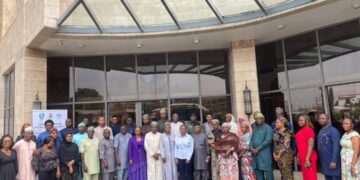ATIKU BEATS ABOUT CHICAGO BUSH
‘EXCERPTS FROM : NO SILVER BULLET FROM CHICAGO — BY SIR FESTUS T. NWIYO, ESQ
On August 7, 2023, Atiku Abubakar, the Peoples Democratic Party (PDP) 2023 presidential candidate, filed case No. 23-5099 (N. D. FCIII.) at the US District Court for the Northern District of Illinois, to compel Chicago State University release President Tinubu’s entire academic records, including Tinubu’s admission and acceptance at the university, dates of attendance including degrees, awards and honours attained by Tinubu at the university, among others – completely outside of the INEC’s eligibility requirements in its Form ECBs.
President Tinubu maintained that the records sought by Atiku should not be released because they fell under a 1974 privacy law for American students:
“indirectly seeks relief against Mr Tinubu by seeking his records that the federal and state governments have determined should be confidential.
See 20 U.S.C. § 1232(g) (describing the purpose of the Federal Educational Records and Privacy Act of 1974 as to protect students from a school’s unauthorized release of a student’s records); 105 ILCS 10/6(a) (prohibiting the release, transfer, disclosure and dissemination of school student records).”
Atiku’s lawyers submitted that the Family Educational Rights and Privacy Act (FERPA) and analogous state laws do not create an independent privilege for educational records and cannot serve as a shield against a court-issued subpoena.
Therefore, President Tinubu cannot use the excuse of privacy law to stop the release of his academic records from the Chicago State University (CSU) to Atiku “for use” in Nigerian Courts, according to her.
Notably, Atiku’s US case have the imprimatur of abuse of court, the US courts appearing to sit on appeal over Nigerian election petitions, and undue interference with presidential elections in a sovereign jurisdiction.
On July 31, Patrick Heneghan, presiding judge at the circuit court of Cook County, Illinois, dismissed the case following its withdrawal by Atiku.
Instructively, Atiku filed this case during the pendency of the sittings of the Presidential Election Petition Tribunal (PEPT). In other words, he had a bad case before the PEPT, and he knew it, and had to turn to plan B: the US Courts for some redemption!
He quickly withdrew the first case he filed in the US against Tinubu even before a hearing date was assigned, only to re-file another case in early August 2023, or thereabouts, before Judge Jeffrey Gilbert (Magistrate Court).
This magistrate ran away with a case of such magnitude in record time, delivering his (erroneous) judgment for the Applicants September 19, 2023 – as if they had a train to catch, throwing caution and contending legitimate concerns of Intervener to the wind!
Atiku’s Special Assistant on Public Communications, Mr. Phrank Shaibu, said the new suit informed the decision of his principal to withdraw an existing case before a circuit court in Illinois, according to Vanguard Newspaper of August 7, 2023.
It reports Mr. Shuaibu as saying that: “Waziri Atiku Abubakar only withdrew the case before a Circuit Court of Cook County, Illinois County, United States of America because he is pursuing the same matter in a higher court and he wanted to avoid abuse of court processes. So, this is just the beginning.” [Emphasis added].
The above statement lends credence to the accusation by President Tinubu’s lawyers that Atiku was engaged in a fishing expeditions – to the extent of abuse of court processes across international jurisdictions.
The US courts assumed jurisdiction in the case because, according to them, the US law permits any “interested person” to request discoveries of documents and testimony for use in a foreign proceeding from persons who ‘reside or are found’ within its district.”
The US court found that Atiku satisfied the requirements being an “interested person.” The court ruled that:
“This matter is before the Court on Atiku Abubakar’s Application Pursuant to 28 U.S.C. §1782 for an Order Directing Discovery from Chicago State University for Use in a Foreign Proceeding (“Application”) [ECF No. 1].
For the reasons discussed below, the Application is granted.” [Emphasis added].
Surely, giving the fact that we do not have similar provisions as the above, or one with the mechanism to admit such evidence procured therefrom under these peculiar circumstances, the alien procedure is improper as far as the content and peculiarities of our justice system is concerned.
Alhaji Abubakar Atiku’s lawyers fancied their case for discoveries against President Bola Ahmed Tinubu as one not: “to conduct a fishing expedition into Intervenor’s private, confidential, and protected educational records.
Rather, Applicant seeks to test (1) the authenticity and origin of 12 pages of documents (including two very different diplomas) that purport to have been issued by CSU (the “CSU documents”) —all of which have already been submitted to the Nigerian courts and widely published in the media; and (2) the basis for CSU’s categorical assertion that Tinubu received a B.S. degree in 1979, given discrepancies between information in the CSU documents and information in his affidavit submitted to INEC.” [Emphasis added].
But, no matter how hard they pretend, it could never be anything thing other than glorified “fishing expeditions” from all indications and the surrounding circumstances of the case, including the timing!
If it was not all “fishing expeditions,” on June 15, 2022, President Tinubu submitted his personal information on the required Forms ECBs to INEC : “The forms were returned on Wednesday, June 15, two days ahead of schedule.”
How Atiku never found it expedient since June 15, 2022 to proceed against Tinubu in the US Courts for discoveries until more than a year after, stands logic on its head; whereas, his complaints in the US courts are centered on these INEC submissions of June 15, 2022, by Tinubu.
Meanwhile, the Nigerian Supreme Court will recognize the fact that equity does not aid the indolent in these pathetic circumstances, better luck next time around.
They also argued before the US Court that:
“As Judge Gilbert noted, the Court of Appeal (PEPT) declined to consider that evidence and the underlying argument because they were not “raised for the first time in the initial Petition,” and that Applicant intends to appeal (and now has appealed) that decision.
Because Applicant submitted evidence in his Application that there is “a mechanism by which new evidence could be presented to the Supreme Court of Nigeria,” the discovery sought meets the “for use” requirement.” [Emphasis added].
Granted that a (limited) mechanism of some sorts by which fresh evidence could be presented to the Supreme Court of Nigeria,” however, the window for its utilization and/or application is closed on September 20, 2023. Granted also that “Judge Gilbert noted, the Court of Appeal (PEPT) declined to consider that evidence and the underlying argument because they were not “raised for the first time in the initial Petition,” he should have immediately deferred to the specialized Nigerian courts on presidential election matters in Nigeria, and stayed its hands out of the cookies!
Instructively, election petitions in Nigeria are specially premised and designed as technical proceedings, and equity aids only the vigilant in these circumstances.
Accordingly, Judge Gilbert proceeded, albeit erroneously – as if on an appeal against the judgments of the constitutionally and properly constituted presidential election petitions tribunal of a sovereign country: Nigeria!
Therefore, his judicial actions and any other flowing from thence, premised on a faulty foundation must not stand, and must be adjudged grossly incompetent, ultra vires, and inconsistent with international norms and standards to all intents and purposes.
Tinubu had always maintained through his lawyers that Atiku’s exploits amounted to a “fishing expedition” because the deadline for the use of fresh documents in Nigerian courts for the personal purpose of Atiku had elapsed – September 20, 2023. Notably, Atiku maintains this lawsuit against Tinubu in the US jurisdiction without joining the PDP as applicants!
Instructively, the following issues must be considered : Is Atiku seeking discoveries in America to support the case he had filed and lost at the court of first instance (PEPT), or it is to introduce a new genre of evidence no matter how fantastic it might seem?
Did the PEPT arrive at a wrong or erroneous finding of FACT on the evidence presented by Atiku at the PEPT that the Supreme Court, in such exceptional circumstances, could be called upon to review?
In which particulars of his Grounds of the Petition or Claims at the PEPT did Atiku plead Tinubu’s gender and/or his academic records to the extent and details sought at the US courts presently, please?
Why was President Bola Ahmed Tinubu not joined in the US case as a necessary party, though it was his personal information that was sought after to be released to Atiku.?
If not personal vendetta, why was/is the Peoples Democratic Party (PDP) not joined in the US case as applicants – to buttress or evince the nexus between the US case and the Nigerian case to wit: CA/PEPC/25/2023?
Instructively, paragraph 7, p.3 of Atiku’s petition is not in doubt as to the true identity of President Tinubu.
Atiku neither contested the president’s identity or gender in his Petition at the PEPT. Paragraph 12 of his petition claims INEC wrongly returned Tinubu as winner.
His Grounds of Petition, as shown in paragraph 16(d), claims Tinubu was not qualified to contest the election at the time of the election. Paragraph 147 @ p.49-52 (Grounds Four-Non Qualification) specifies the documents the Petitioner proposed to rely on to prove his petition against the Respondent (President Tnubu).
A party is bound by his pleadings. Instructively, throughout the length, breadth, and width of Atiku’s Petition before the PEPT is not the slightest mention of Chicago State University (CSU), the discovery proceedings in the US, and/or any of the academic records now sought in the US courts! As always, a party is bound by his pleadings.
The rules of evidence, practice, and procedures in this country are well recognised and respected.
Without a clear judicial precedence, the Nigerian courts’ receptiveness to this novel procedure invoked by Alhaji Atiku Abubakar of the Peoples Democratic Party (PDP) based purely on personal voyage/interests, as opposed to any state or national interests at stake, remains unclear. Besides, where even the equities are equal, the first in time always prevailed!
While President Tinubu has constitutionally guaranteed right to the protection of his privacy to wit: his academic records at CSU, Atiku, contrarily, does not have a compelling, competing, and/or guaranteed right to the Nigerian presidency in 2023, either under any Constitution – to warrant and/or necessitate the release of President Tinubu’s academic records, which in most likelihood, ends up being a mere academic exercise in futility before the Nigerian Supreme Court!
He neither guaranteed the US Courts of their admissibility in evidence as fresh evidence, nor the weight, if any at all, based on preponderance of Nigerian judicial authorities, to be attached to it in the Nigerian courts!
This is especially the case when Nigerian courts are not bound by what transpires in American courts, a proceeding having the trappings of interference with Nigeria’s electoral and judicial court processes – to introduce new or fresh evidence after the conclusion of a trial and alter the complexion of a presidential election through the backdoor!
Section 6 of the Election Judicial Proceedings Practice Directions, 2022, stipulates that a notice of appeal shall be filed at the registry of the tribunal or court of appeal within 21 days in respect of a final decision, and 14 days in respect of interlocutory rulings.
However, section 2 of the Supreme Court Election Appeals Practice Directions, 2023, requires an appellant to file in the registry of the court of appeal, notice and grounds of appeal, within 14 days from the date of delivery of judgment appealed against.
Notably, the presidential petition election tribunal delivered its judgment on September 6.
Therefore, Atiku had up till September 20 to file his appeal — which he did on September 18.
Accordingly, time for filing any fresh evidence has elapsed by the effluxion of time; whereas, election petitions are very technical proceedings.
However, in a fresh application before the US court dated September 27, asking the US Court to overrule Tinubu’s objections in its entirety, Atiku, through his American attorneys argued, without substantiation or legal basis on Nigerian judicial precedence and in the typical manner of a desperate fishing expedition, that the documents they seek could still be used in election litigation back home in Nigeria.
But, how they still “are used” in election litigation was completely left out of mention to the conjecture of the US court.
This is a matter of strict Nigerian law and procedure; not American courts’ conjectures – if we must go that route! They asked the US court to :
“enter an order requiring production of documents no later than October 2, 2023, and the deposition scheduled no later than October 3, to allow time for transcripts to be finalized…the discovery obtained should be sent to Nigeria (which is six (6) hours ahead) by October 4 so that such evidence may, in turn, be filed with the Supreme Court by October 5, which is when Applicant’s Nigerian counsel intend to submit any new evidence to the Supreme Court.”
See the cases of VAB Petroleum Inc. v. Momah (2013) 218 LRCN (Pt. 1) 66, and, The Board of Customs and Excise v. Barau (1987) 10 SC 48. In the latter case, it was held that:
“Finally, on this issue, I may have to reiterate the function of an Appellate Court on questions of facts.
It is mainly limited to seeking whether or not there was evidence before the trial court upon which its decision on facts was based, whether it wrongly accepted or rejected any evidence tendered at the trial; whether evidence called by either party to the conflict was put on either side of the imaginary scale and weighed one against other.
In other words, whether the trial court properly evaluated the evidence, whether the trial court correctly approached the assessment of the evidence before it and whether the evidence properly admitted was sufficient to support the decision upon the inference drawn therefrom.
This is the only way and procedure open to an appellate court in the consideration of an appeal brought before it.”
It is trite that it is not in the province of an appellate court to take fresh evidence.
However, a digest of the Supreme Court Rules 1985 (As Amended) in Order 2 Rule 12 provides instances when the court may discretionarily act otherwise for good and compelling cause : The Applicant must apply for leave on notice of motion before the date set down for the hearing of the appeal ; The Application shall be supported by affidavit of facts which form the foundation of the application as well as the nature of evidence or document sought to be tendered for the first time.
Section 22 of the Supreme Court Act, 2010, provides to the effect that:
“The Supreme Court may, from time to time, make any order necessary for determining the real question in controversy in the appeal, and may amend any defect or error in the record of appeal…and generally shall have full jurisdiction over the whole proceedings as if the proceedings had been instituted and prosecuted in the Supreme Court as a court of first instance and may rehear the case in whole or in art or may remit it to the court below for the purpose of such rehearing or may give such other directions as to the manner in which the court below shall deal with the case in accordance with the powers of that court.”
In the case of Ehinlawo v. Oke, (2008) 16 NWLR (Pt. 1113) 357 at 383 -384, Onnoghen JSC (as he then was) held that:
“Order 2 Rule 12 (1) of the Supreme Court Rules which guides the court in the applications of this nature provides, thus: “A party who wishes the court to receive the evidence of witnesses (where they were not called at the trial) or to order the production of any document, exhibit or other thing connected with the proceedings in accordance with the provisions of section 33 of the Act shall apply for leave on notice of motion prior to the date set down for the hearing of the appeal. It is also settled that for the court to exercise that discretion one way or the other, it must act not only judicially but (sic also) judiciously.
It is in an effort at attaining the standard of exercising its discretion judicially and judiciously that the courts have set down certain principles/conditions as guides.
The principles are : 1) the evidence sought to be adduced must be such that could not have been with reasonable diligence obtained for use at the trial; 2) the evidence should be such that if admitted would have an important, not necessary (sic necessarily) crucial effect on the whole case, and, 3) the evidence must be such that it is apparently credible in the sense that it is capable of being believed and it need not be incontrovertible — see UBA Plc v. BTL Ind. Ltd. (2005) 10 NWLR (Pt. 933) 356 at 370–371. The above conditions must co-exist for the court to exercise its discretion in favour of the applicant.”
In the cases of Wema Securities and Finance Plc v. NAIC (2015) LPELR-24833 (SC), and Olubunmi Oladipo Oni v. Cadbury Nigeria PLC (2016) NGSC 134, Justice Chima Centus Nweze J.S.C. held:
“Of course, it is still a valid general principle that where a party seeks to raise a fresh issue on appeal, he must seek the leave of Court. Where he fails to do so, the issue, which ipso facto is rendered incompetent, would be liable to be struck out, A.G. Oyo State v Fairlakes Hotel Ltd (1988) 12 SC (Pt. 1) 1; (1968)5 NWLR (pt.92) 1; Uor v. Loko (1988) 2 NWLR (pt. 77) 430. However, the issue of jurisdiction constitutes an exception to this general principle for it (such an issue of jurisdiction) could be raised for the first time before an appellate Court, with or without leave, Obiakor and Anor v. The State (2002) 10 NWLR (pt. 776), 625 G; Gaji v. Paye (2003) 8 NWLR (pt. 823) 583….” [Emphasis added].
Notably, Atiku’s American lawyers are, presumably licensed to practice law within American jurisdiction, in the state(s) where they practice.
Accordingly, they are not experts in Nigerian laws – to proffer any legal opinions on matters of Nigerian laws, as it were.
Whereas, ad nauseum is a cardinal principle of law that justice must not be sacrificed at the altars of costs, speed, and expediency, besides, the stakes are too high in this case: the presidency of the Federal Republic of Nigeria.
The US courts must be judicious and cautious enough not to act on the spur of the moment and set dangerous legal precedence if it acts in vein in the final analysis!
It is a strange and novel procedure having the trappings of election interference in a foreign country – to commence a failed action in one sovereign jurisdiction, and run to another sovereign jurisdiction to hurriedly institute another action for discoveries solely to generate evidence and proofs that you failed to produce in the earlier case, for purposes of appeal. Instructively, the US and Nigerian jurisdictions are not one binary and fluid jurisdiction; one jurisdiction must not seem to be dictating to or holding the brief of and/or for another!
Excerpts culled out from my book titled, “The Tinubu 2023 Presidential Mandate; Defending the Mandate.”
(vitalnewsngr.com)


